Big Sky Bravery
Military Special Ops Find Joy Again in the Montana Wilderness

As a member of the U.S. Special Operations (SOF) community for nearly two decades, Rob Vaughan has accepted the likely imminence of his own death more times than he cares to count.
When you dedicate your life to joining the ranks of the most highly-trained and supremely-skilled military units on the planet, a willingness and acknowledgment that you could pay the ultimate sacrifice comes with the territory. And while many of these elite military members also have spouses, children, grocery lists, and mortgages, none of that has a place when it comes to taking down the most sinister and high-profile threats to our nation.
"We're set against the hardest targets known to man," explains Vaughan, who served nearly 19 years of his 20-year military career as a member of the U.S. Army Special Forces–colloquially known as the Green Berets–before he retired in 2014.
"We resigned ourselves. There were times I said, 'I'm going to die. I know I'm going to die, and this is probably the rotation,'" he says. "So having to talk to your family about that–specifically my wife–you actually make funeral arrangements before you deploy and plan out to the detail so you can take the burden off of them if you have to make the hardest sacrifice there is."
In the early morning hours of August 6, 2011, a Taliban fighter in Afghanistan shot an Extortion 17 Chinook helicopter out of the sky. Thirty-eight of the world's most experienced and highly-trained commandos lost their lives that day. There were no survivors.
Back at home, Vaughan's wife's phone began ringing off the hook as word of the single greatest loss of American life in the Afghan war tore through the Special Operations community. One of the fallen heroes aboard the flight bore a name similar to that of her husband. "She started getting calls from all of these people offering her condolences," he said. "She thought it was me."

THE ILLUSION OF PEACE
In the wake of President Joe Biden's declaration in August of 2021 that "the war in Afghanistan is now over," many Americans imagined our military servicemembers letting out a collective sigh of relief and hopping on the next flight home to their families.
"I'm not convinced that the general public and civilians understand that there are deployments happening right now and that we have people overseas at this moment who are actively being attacked," explains Ashley Smith, an active-duty U.S. Army Special Operations servicemember who has devoted more than 13 years to her military career.
"We're still deploying and active around the world and we still have a very high OPTEMPO," said Smith, who was deployed earlier this year. "We're looking at multiple threats daily from different angles… I don't think the general public realizes that."
Transitioning from these intense, high-stakes special ops deployments back to regular life at home carries its own trials and tribulations—especially considering the physical and mental toll such deployments have on our elite warriors.
"Basically, half of your life is spent in combat, and you come home and it seems like nobody really knows or cares to know," says Skip Soderholm, a U.S. Army command sergeant major who led 200 servicemembers while serving as senior leader of an undisclosed special mission unit.
Soderholm deployed 11 times during the Global War on Terror to both Iraq and Afghanistan, serving 25 years before his retirement in 2019.
"Most of what we did was a lot of direct-action missions, which meant that we went in and targeted specific individuals," he explains. "We went in to capture high-value targets–the leadership level of what was Al-Qaeda and targets like Saddam Hussein."
"You come home and you're losing teammates and it is barely even a blip on the news, and people are just worried about what the Kardashians are doing," Soderholm says.
The severe physical toll these deployments take on our Special Operations servicemembers also cannot be overstated. Gunshot wounds, broken bones, and traumatic brain injuries are extremely commonplace in a job fraught with explosions and hard-hitting attacks.
"I went through a program at Walter Reed at Bethesda, Maryland, and they do brain scans and we learn we have a lot of brain injuries," Soderholm says. "The longer you stay in Special Operations, the more your body breaks down."

BIG SKY BRAVERY: A PROACTIVE APPROACH
Josh McCain, a Three Forks native, made a name for himself in the business world at an early age while living in New York City with his wife, Kristi.
"I had landed a job that I thought was my dream job," McCain recalls. "I was able to scale the company and was financially rewarded for it. I had just gotten a quarterly bonus in 2015 and felt like I was on top of the world with my career when my brother-in-law came back from his 14th deployment."
McCain's brother-in-law, Jeremy Keller, enlisted in the U.S. Army during his junior year of high school and went to Basic Training just three months before the 9/11 terrorist attacks. He served 17 years of his 20-year military career in Special Operations, deploying 18 times and spending more than six years in combat.
But when Keller came home in 2015, McCain realized he was struggling—all the years of fighting the Global War on Terrorism had taken a hefty toll.
"I was afraid my brother-in-law was going to kill himself," McCain flatly recalls. "I started looking on Google for programs that might help him, and I found 45,000 nonprofits for veterans, but I couldn't find a single charity for solely active-duty military, let alone for those in Special Operations."
McCain immediately sat down and drew up a business plan to launch a foundation dedicated to serving active-duty Special Operations servicemembers. He knew he wanted to take a proactive approach by providing opportunities for support and improved well-being while servicemembers were still in the midst of their careers, as opposed to the reactive resources provided by programs established to assist military veterans. And he knew that Montana was the ideal place for weary, adrenaline-fueled warriors to find the refuge that would allow them to decompress and experience peace once again.
"I ran my plan by Jeremy and he said if we could pull this off, we could save a lot of people," McCain explains. "So, my wife and I quit our jobs and we moved to Bozeman."
He officially established Big Sky Bravery as a nonprofit in September of 2015. Keller, who retired from the U.S. Army with 20 years of service in 2021 and is now the foundation's president, helped recruit the new program's first recipients the following year.
"My brother-in-law stuck his neck out and found three individuals inside his unit and told them about the program," McCain says.
The bond Keller had established with his fellow commandos during their years of service acted as a powerful initial catalyst. Because someone who the Special Operations community trusted was vouching for the foundation and its intent, Big Sky Bravery was able to gain the attention of Special Operations leaders who might have otherwise been skeptical or resistant. The nonprofit welcomed its first program "task force" recipients in 2016.

BURNING THE CANDLE DOWN
The team at Big Sky Bravery has worked tirelessly to establish a network of patriotic civilians, retired military members, and generous local businesses who are committed to providing these elite heroes with opportunities to reestablish a sense of brotherhood and connectivity within Montana's restorative surroundings.
The nonprofit has nothing to do with choosing who attends its weeklong task force programs.
"You can't sign up for a task force," McCain explains. "Everyone is internally selected within the Special Ops organizations and they choose their own from those who need it most. Who are we as staff to say who can come when we're not the ones out there fighting? One of the greatest gifts is that everyone who is chosen to come out here is internally selected by their own peers."
Each task force is comprised of three to five recipients and a corresponding number of specially-vetted civilian volunteers– some of whom are past task force participants themselves. From the moment these weary heroes step off the plane and into the fresh Montana mountain air, Big Sky Bravery works diligently to provide them with the brotherhood they need to help them focus on their emotional and psychological well-being as well as a reconnection with others—but with themselves.
"Most of what we do is in and around the Big Sky area," McCain says. "We start out with high-adrenaline activities at the beginning, then work into more of the healing aspects later. We have to burn that candle down."
Activities vary depending on the season. Some task forces spend the day tearing down the mountain on skis, others embark on challenging hikes that end with a steak dinner on a 10,000-foot-high ridge, some groups take off on side-by-side explorations, and others head downriver on whitewater rafting adventures—just to name a few.
Fly-fishing with expert guides, deep chats around the campfire, and slowing down to appreciate the stunning scenery surrounding them also provide opportunities for decompression, reflection, and openness with one another.
"Sometimes it's sitting around the campfire asking 'how you doing with the guy in the mirror?'" Vaughan says. "In our background and culture, that is almost looked down upon because you have to be the macho man and the alpha male and show no weakness–but how do you deal with that after you come home?"
Hearing about how others have handled those transitions and the issues they encountered not only helped him, but has also enabled him to serve as a mentor to the next generation of Special Ops servicemembers who are going through their own struggles.
"I realized I don't have to be the biggest and the fastest and the strongest," Vaughan says. "Big Sky Bravery is bigger than me. It is a family and it is special and it means so much to so many people… I loved it."
Smith says she went into her task force experience hoping for rest and relaxation, but that she came out with a trusted network of lifelong friends whom she knows she can always reach out to.
"We talked about things that people generally don't want to talk about," she recalls. "You walk away remembering you do have people to your left and right and this is a shared experience."
"There is a lot of guilt about being in the military and trauma of how that impacts your relationships," she adds. "This helped reaffirm that there are men and women out there who respect what I do and it gives me even more confidence. This is my career and I love it and I am doing the right thing."
Soderholm had never been to Montana prior to attending his first task force in 2018. Now he comes back four to six times every year to serve as a Big Sky Bravery volunteer or to visit friends he's made along the way.
He says the most pivotal experience he had during his first task force occurred as he was hiking down a mountainside with McCain one day as the morning sun broke over a distant ridgeline, bathing them in a palette of warm gold and crimson. "A counselor had asked me about three years before when the last time was that I felt joy, and she was a bit taken aback because I didn't know what to say or how to even begin to answer that," Soderholm says. "But that day with Josh—here I am, coming down the mountain into the sunrise, and I realized: This is joy. Big Sky Bravery got me to recognize and feel joy again."

SUPPORTING THE MISSION
The average Special Ops servicemember who participates in a Big Sky Bravery task force is just 35 years old and has been on 14 combat deployments. Eighty-five percent of them have suffered at least one traumatic brain injury.
The organization had 12 task forces in 2020. That number jumped up to 22 groups in 2022, and they're planning for 26 more in 2023. Big Sky Bravery has also begun operating task forces for female Special Ops servicemembers, as well as an identical program for the spouses of our nation's elite warriors.
"We've been scaling pretty dramatically," McCain says. "But Americans need to be a hell of a lot more proactive for our nation's military than we're being right now. Don't just thank a servicemember—do something for them."
"And don't forget about their spouses," he adds. "They're just as much heroes as the ones who are going out there."
McCain says one of the most impactful things people can do to support Big Sky Bravery's mission is to write a letter to an anonymous servicemember to tell them why they are appreciated and valued. The program will deliver any letters they receive to future task force participants.
PLEASE MAIL YOUR MESSAGES TO: Big Sky Bravery 215 Quail Run Road Suite A Bozeman, MT 59718 As a nonprofit organization, Big Sky Bravery relies on the community to help ensure its mission continues. To make a financial donation to Big Sky Bravery, visit www.bigskybravery.org/donate


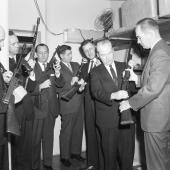
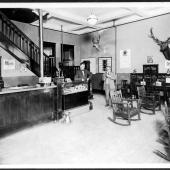


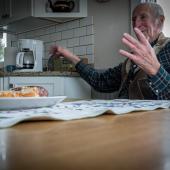
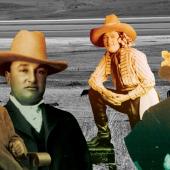


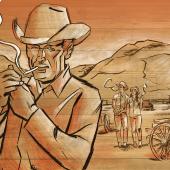
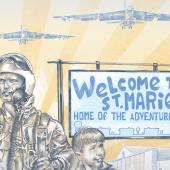
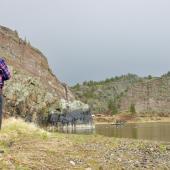
Leave a Comment Here